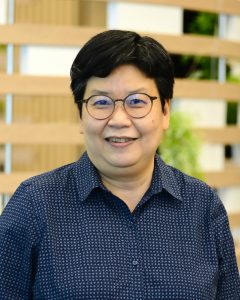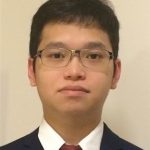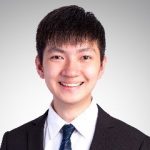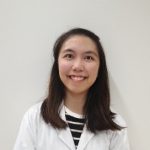
Prof CHAI Li Lin, Christina

Professor CHAI Li Lin, Christina
BSc (Chemistry) Hons (University of Canterbury, NZ)
PhD (Australian National University, Australia)
Post-Doc (Oxford University, UK)
Department of Pharmacy and Pharmaceutical Sciences, National University of Singapore
18 Science Drive 4, Singapore 117543
Tel: +65 6601 1061
Fax: +65 6779 1554
Email: phacllc@nus.edu.sg
Biography
Prof Christina Chai obtained her BSc (Hons) from the University of Canterbury, Christchurch, New Zealand and her PhD in synthetic organic chemistry from the Research School of Chemistry, Australian National University, Canberra under the mentorship of the late Professor Athel Beckwith, FRS. Following her PhD, she was awarded a Samuel and Violette Glasstone Research fellowship at the University of Oxford, UK where she studied bioorganic reaction mechanisms. This was followed by a Faculty position in the Department of Chemistry, Victoria University of Wellington, NZ (1991-1993) and the Department and Research School of Chemistry, Australian National University (1994-2004) where she was Associate Professor.
She joined the Institute of Chemical and Engineering Sciences as a Principal Scientist and Programme Manager of the New Synthesis Techniques and Applications (NSTA) Programme from 2004 till 2011. From 2008-2011, she also held a co-appointment as Director of Graduate Affairs, Science and Engineering Research Council, A*STAR. From August 2011-Dec 2015, Prof Chai held a joint appointment as Associate Professor in the Department of Pharmacy, National University of Singapore and the Institute of Chemical and Engineering Sciences, A*STAR. She was Deputy Head of Department from Jan 2013-April 2014 and Assistant Dean in the Faculty of Science, NUS, from June 2013 till Dec 2015. Prof Chai is currently Head of Department since Jan 2016.
My research interests lie in the design and development of bioactive compounds for the treatment of diseases and as probes or tools to elucidate biological mechanisms or to effect biological processes.
The development of small molecule drugs for the treatment of diseases remains a continual challenge in healthcare. Existing drugs maybe rendered ineffective with time due to resistance (e.g. anti-bacterials); new diseases have emerged (eg. COVID-19) and there are diseases that had previously been eradicated or are localised in certain regions that have re-emerged globally (e.g. Chikungunya). In addition, there are still many complex diseases (e.g. cancer, neurodegenerative diseases) for which there are no effective cures. In the past 5 years or so, my group has been focussing on the development of drugs for the treatment of anti-inflammatory conditions, infectious as well as neurodegenerative diseases. We are especially interested in natural products as lead compounds in drug discovery, and by understanding the mechanism of action of natural products, we are able to design nature-inspired therapeutic drugs for different therapeutic areas.

Figure 1: Workflow for the investigation of andrographolide as an anti-inflammatory drug and the design and development of an andrographolide-inspired anti-inflammatory agent. (taken from Eur. J. Med. Chem., 2020, 204, 112481)
The advances in medicine have led to potential new therapies such as stem cell therapies and genome editing methods for the treatment of certain diseases. The CRISPR/Cas9 system is an example of how biology has been revolutionised to make genome editing more viable. However, much research is still needed to improve the efficiency and precision of gene editing. Numerous studies have reported the use of small molecules for improving gene editing. Our interest in this area is to investigate the mechanisms of some of the reported small molecules with the aim of developing new compounds with better efficiency and selectivity for gene editing.
Although not my primary area of research, I am fascinated with how nature designs processes and materials for their specific functions. For example, Nature is remarkable in its ability to develop various biomaterials for different functions and properties using seemingly simple building blocks. One such class of building blocks is the catecholamines typified by the biologically active dopamine and L-3,4-dihydroxy-phenylalanine. Dopamine is the monomer that forms the biopolymer for skin and hair pigment known as eumelanin and pheomelanin, while 3,4-dihydroxy-phenylalanine containing proteins have bioadhesive and sclerotizing functions in a number of invertebrates. We are specifically interested in developing biomimetic materials based on catechols for biomedical applications.
- K.-C. Ching, Q.T.N. Tran, S.N. Amrun, Y.-W. Kam, L.F.P. Ng*, C.L.L. Chai*, Structural Optimizations of Thieno[3,2-b]pyrrole Derivatives for the Development of Metabolically Stable Inhibitors of Chikungunya Virus, J. Med. Chem., 2017, 60, 3165-3186.
- Q. Zhong, F. Laco, M.-C. Liao, T.L. Woo, S.K.W. Oh,* C.L.L. Chai*, Influencing the Fate of Cardiac and Neural Stem Cell Differentiation Using Small Molecule Inhibitors of ALK5. Stem Cells Translational Medicine, 2018, 7, 709-720.
- Q.T.N. Tran, W.S.F. Wong*, C.L.L. Chai*, The identification of naturally occurring labdane diterpenoid calcaratarin D as a potential anti-inflammatory agent Eur. J. Med. Chem., 2019, 174, 33-44.
- J.-B. Vendeville, R.F. Matters, A. Chen, M.E. Light, G.J. Tizzard, C.L.L. Chai*, D.C. Harrowven*, A synthetic approach to chrysophaentin F, Chem. Commun, 2019, 55, 4837-4840.
- Q.T.N. Tran, D.W.S. Tan, F.W.S. Wong*, C.L.L. Chai*, From irreversible to reversible covalent inhibitors: harnessing the andrographolide scaffold for anti-inflammatory action, Eur. J. Med. Chem., 2020, 204, 112481.
On biomimetic materials
- Lyu, H. Song, N.L. Yakovlev, W.S. Tan,* C.L.L. Chai*, In situ insights into the nanoscale deposition of 5,6-dihydroxyindole-based coatings and the implications on the underwater adhesion mechanism of polydopamine coatings, RSC Adv., 2018, 8, 27695-27702.
- Lyu, N. Hsueh, C.L.L. Chai*, Direct Evidence for the Critical Role of 5,6-Dihydroxyindole in Polydopamine Deposition and Aggregation. Langmuir, 2019, 35, 5191-5201.
- Lyu, N. Hsueh, C.L.L. Chai*, Unravelling the polydopamine mystery: is the end in sight?, Polym. Chem., 2019, 10, 5771-5777.
Group members

Dr Nathanael Hsueh graduated with a BSc (Hons) in Chemistry from the University of Warwick in 2013. He subsequently pursued a PhD in Chemistry, working on organic synthesis, and graduated from the same university in 2017. He is currently working on the synthesis of novel organic compounds to be used for the construction of biomimetic coatings.

Mr Malcolm Choo graduated with a BSc (Hons) in Chemistry from the National University of Singapore. His research focuses on harnessing the potential of natural products for the development of novel anti-inflammatory drugs. Currently, he is looking at the total synthesis of coumarin natural products and their structural analogues for the treatment of diseases associated with inflammation.

Ms Tran Thi Ngoc Quy received her BSc (Hons) in Pharmacy from the National University of Singapore (NUS). Her current research is on developing novel anti-inflammatory drugs from labdane diterpenoids for the treatment of diseases and conditions associated with chronic inflammation. Quy is co-supervised by Professor Fred Wong in the Department of Pharmacology, YLL School of Medicine, NUS.

Mr Ho Wei Shen graduated with a BSc (Hons) in Chemistry from the National University of Singapore. He is currently pursuing a PhD with a central theme of studying infectious diseases, specifically new anti-microbials. He is investigating b-turn mimetics as a means to stabilize antimicrobial peptides for potential applications as anti-bacterials. Wei Shen collaborates with Professor Rachel Ee, Department of Pharmacy and Professor Justin Chu, Department of Microbiology and Immunology, NUS.

After graduating with BSc (Pharmacy) with Honours from the National University of Singapore (NUS), Mr Adrian Lee completed his pharmacist pre-registration training and worked as a locum pharmacist before returning to do a PhD. His research is on small molecule medicinal chemistry optimisation in the hot area of CRISPR-Cas9 genome editing. Many mysteries continue to surround small molecules previously reported to be able to improve CRISPR-Cas9 genome editing, which Adrian will attempt to unravel during his PhD stint. Adrian is co-supervised by Dr Tan Meng How, Genome Institute of Singapore, A*STAR.

Ms Kimberly Ong is a trainee under the SGUnited Traineeship programme, and was a graduate of Department of Chemistry, NUS. She is working on a project to improve the synthesis of a natural product known as Calcaratarin D (CalD), which has been shown by our group to show very good anti-inflammatory properties with minimal toxicity. She is also investigating methods to improve the solubility of CalD to facilitate the oral delivery of the active.
